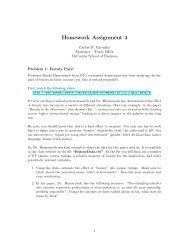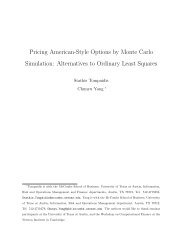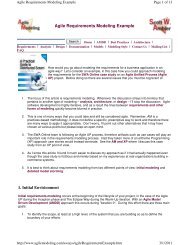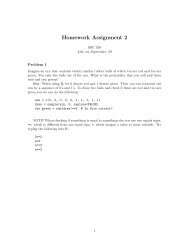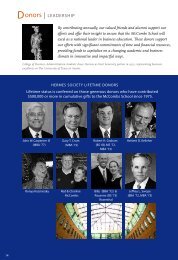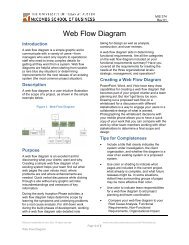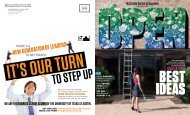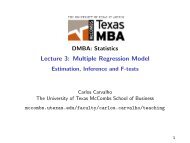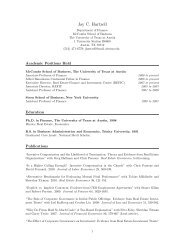Download a PDF version - McCombs TODAY - The University of ...
Download a PDF version - McCombs TODAY - The University of ...
Download a PDF version - McCombs TODAY - The University of ...
Create successful ePaper yourself
Turn your PDF publications into a flip-book with our unique Google optimized e-Paper software.
Startup<br />
job well done<br />
Asking for It<br />
<strong>The</strong> negotiating trick that has<br />
saved students millions<br />
By Mike Agresta<br />
Many <strong>of</strong> the most successful<br />
people in business are<br />
assertive negotiators. But<br />
among the general population,<br />
they are the exception rather than<br />
the rule, says Doug Dierking, senior lecturer<br />
<strong>of</strong> management.<br />
“It’s very common for people to feel<br />
reluctant to ask for things, even things<br />
they really are entitled to,” Dierking<br />
says. “If something is a mistake or an<br />
inconvenience, people just accept the<br />
inconvenience.”<br />
To combat this timidity, Dierking and<br />
other teachers <strong>of</strong> the popular “Art and Science<br />
<strong>of</strong> Negotiation” class at <strong>McCombs</strong><br />
have developed an assignment that<br />
encourages students to start negotiating—<br />
in the real world.<br />
<strong>The</strong> ASK assignment, as it’s known,<br />
requires students to ask for something,<br />
large or small, that they wouldn’t otherwise<br />
request—an upgrade at a hotel or on<br />
a plane, free cookies at a sandwich shop,<br />
or a beneficial change to an important<br />
contract. Students have about two weeks<br />
to complete the assignment, and they<br />
each must turn in a short paper explaining<br />
the circumstances <strong>of</strong> the ask and their<br />
negotiation approach.<br />
Taken together, these small asks can<br />
add up. In one Houston MBA class, the<br />
total reached a stratospheric $5.16 million,<br />
mostly due to students in the energy<br />
industry who negotiated small changes to<br />
enormous oil and gas contracts. Back on<br />
earth, one evening MBA class averaged<br />
$1,000 <strong>of</strong> negotiated benefits per person.<br />
<strong>The</strong> assignment’s main lesson is one<br />
that holds power long after a student<br />
leaves the classroom: the most important<br />
step to successful negotiating is to ask.<br />
According to Dierking, a great negotiator<br />
regards everyday situations as opportunities<br />
for negotiation.<br />
“We tend to only think about negotiating<br />
in certain circumstances where it’s<br />
thought <strong>of</strong> as okay, such as purchasing a<br />
house or a car, or at a flea market,” he<br />
says. “But in other cultures, people negotiate<br />
for everything. I tell my students that<br />
they can negotiate at Home Depot or even<br />
the grocery store sometimes.”<br />
<strong>The</strong> two keys to negotiation success,<br />
Dierking says, are confidence and perspective-taking.<br />
“Most <strong>of</strong> the time, when people look at<br />
negotiation they only consider their own<br />
perspective,” he says. “<strong>The</strong>y only think<br />
about what I want. People who are very<br />
successful are good at putting themselves<br />
in the other sides’ shoes.”<br />
For instance: “Picking the right time is<br />
important. If you’re at a store and there’s a<br />
long line, and the ask would inconvenience<br />
the person or make their job more difficult,<br />
then it’s probably not the right time.”<br />
Equally important, Dierking says, is to<br />
ask for something reasonable, something<br />
the requestee can conceivably grant. “If<br />
you’re at a Lowe’s or Home Depot, you<br />
have to get a store manager or assistant<br />
manager,” he says. This principle also<br />
extends to higher-stakes negotiations over<br />
salary or contracts.<br />
<strong>The</strong> ASK assignment discourages students<br />
from <strong>of</strong>fering requestees anything<br />
in return.<br />
“We’re building a specific skill that will<br />
be part <strong>of</strong> a toolbox <strong>of</strong> negotiating skills,”<br />
Dierking says. When askers feel trepidation<br />
about completing the assignment, he<br />
advises that they ask for something lowrisk,<br />
such as free shipping.<br />
According to Dierking, inexperienced<br />
negotiators make three common mistakes:<br />
asking for something that is not reasonable,<br />
making a demand instead <strong>of</strong> an ask,<br />
and not asking in the first place. <strong>The</strong> last,<br />
<strong>of</strong> course, is the most common.<br />
“<strong>The</strong> worst somebody can do is say no,<br />
but you’ve already got no,” Dierking says.<br />
“You’re working from no.”<br />
thinkstock<br />
ASKS<br />
LARGE<br />
AND<br />
SMALL<br />
Real benefits<br />
students<br />
asked for—and<br />
received.<br />
Reduced travel<br />
costs for a volunteer<br />
group heading to New<br />
Orleans. (STRAT-<br />
EGY: Appeal to the<br />
requestee’s desire to<br />
do good.)<br />
Free satellite radio<br />
subscription<br />
A $10,000 raise<br />
Use <strong>of</strong> expired<br />
coupon<br />
Monthly<br />
reduction for<br />
a cable or phone<br />
bill. (Possibly the<br />
most popular ask<br />
among students,<br />
Dierking says)<br />
Forgiveness <strong>of</strong><br />
a $150 late fee<br />
Reduction<br />
in rates from<br />
a consulting firm,<br />
totaling $12,800 over<br />
640 hours<br />
Upgrade to a<br />
suite at a hotel<br />
Upgrade to<br />
business travelers’<br />
lounge and a first<br />
class domestic seat.<br />
(STRATEGY: When<br />
someone, i.e., an<br />
airline counter agent,<br />
takes an interest in<br />
your story—a big<br />
presentation the next<br />
day—it’s a good time<br />
for an ask.<br />
Extra sauce at<br />
a chicken restaurant<br />
where the policy is that<br />
you have to pay for<br />
it. (“A moral victory,”<br />
Dierking says.)<br />
THE BIG QUESTION<br />
How Can the Tax<br />
Code be Fixed<br />
Judging by the wild national debate, taxes might need to join politics and<br />
religion as a topic one should not discuss in polite company. But having<br />
narrowly escaped the fiscal cliff and still facing a $1 trillion deficit, the<br />
country can’t afford to ignore the issue. Accounting pr<strong>of</strong>essor Lillian Mills<br />
<strong>of</strong>fers her suggestions for a more rational tax system.<br />
Wh e r e I t h i n k w e n e e d<br />
the fastest reform is on<br />
the entitlement side.<br />
When people hear “entitlements,”<br />
they <strong>of</strong>ten think “welfare” in<br />
a negative way. But Social Security and<br />
Medicare are promises to all our elderly—<br />
not just to the poor elderly. And our promises<br />
exceed our capacity.<br />
That’s partly because retirees are living<br />
longer each generation. Remember<br />
that when Social Security became law in<br />
the 1930s, the average life expectancy<br />
was about 65. As the number <strong>of</strong> retirees<br />
grows, relative to the working populace,<br />
it will not be possible to tax the<br />
working populace sufficiently to fund<br />
those entitlements—even if the majority<br />
<strong>of</strong> Americans supported higher payroll<br />
and income taxes.<br />
Continuing to increase the full retirement<br />
age for Social Security [it is currently<br />
67, for those born after 1959] will<br />
help some. Increasing the initial eligibility<br />
age beyond 62 would help much<br />
more. Gradually increasing the Medicare<br />
eligibility age would reduce our costs<br />
even more.<br />
<strong>The</strong> benefit from increasing those ages<br />
is not merely on the cost-containment<br />
side. If a 53-year-old like me works until<br />
age 70, I continue to pay income taxes<br />
and payroll taxes before receiving a Social<br />
Security payment or using Medicare. That<br />
helps our national budgets.<br />
We can’t afford to increase those ages<br />
immediately on near-retirees. <strong>The</strong>y need<br />
to be phased in because we need time for<br />
savings rates and job markets to adapt.<br />
But we can build in larger future increases<br />
now, and we should.<br />
We also need additional tax revenues.<br />
Our deficits and public debt show that our<br />
current revenues are not sufficient to pay<br />
for our current spending.<br />
One way to raise taxes without raising<br />
rates is through cutting “tax expenditures”—<br />
the tax savings generated from deductions<br />
and credits, or from making certain types<br />
<strong>of</strong> income taxable that used to be exempt.<br />
<strong>The</strong> largest tax expenditures include<br />
the nontaxable compensation we enjoy<br />
from employers: pension and 401(k)<br />
contributions and healthcare. In addition,<br />
many Americans receive substantial<br />
deductions <strong>of</strong> mortgage interest and<br />
property taxes, both <strong>of</strong> which make housing<br />
less costly.<br />
One proposal is to cap itemized deductions,<br />
other than charitable contributions.<br />
Limiting deductions to a fixed amount<br />
would still permit low- and middleincome<br />
taxpayers to fully enjoy subsidies<br />
to housing like the mortgage interest<br />
deduction—while limiting subsidies for<br />
the most expensive housing.<br />
Making an exception for charitable contributions<br />
would still permit major gifts<br />
that benefit recipients like universities. So<br />
gifts to UT could still be deducted, subject<br />
to the standard limit <strong>of</strong> 50 percent <strong>of</strong><br />
adjusted gross income.<br />
On tax expenditures, Republicans and<br />
Democrats may be able to find bipartisan<br />
support. By curtailing them, Republicans<br />
can keep promises not to raise explicit<br />
tax rates, and Democrats can reduce the<br />
impact on low-income taxpayers.<br />
Unfortunately, many tax expenditures<br />
have huge popular support, and the medical,<br />
retirement, and real estate lobbies are<br />
all-powerful. President Obama needs to<br />
engage the country in this conversation<br />
in a less political way, the way President<br />
Reagan persuaded the country that we<br />
needed a broader tax base to be able to<br />
reduce some tax rates. Any tax reform will<br />
require leadership from the top.<br />
Department Chair Lillian Mills is the Wilton<br />
E. and Catherine A. Thomas Pr<strong>of</strong>essor<br />
<strong>of</strong> Accounting. She researches tax compliance,<br />
accounting for income taxes and<br />
effective tax rates, and international taxation.<br />
Mills was previously a senior manager<br />
in taxation for Price Waterhouse<br />
and is a former president <strong>of</strong> the American<br />
Taxation Assocation.<br />
Startup<br />
<br />
<strong>The</strong> State <strong>of</strong> BBAs<br />
Almost a third <strong>of</strong><br />
undergraduates,<br />
31%<br />
spend 21-30<br />
hours per week on<br />
homework, and<br />
56%<br />
plan on applying<br />
to graduate<br />
school, according<br />
to a spring 2012<br />
survey <strong>of</strong> students<br />
that sought<br />
to assess the<br />
BBA program.<br />
Students also said<br />
they want more<br />
international<br />
business and<br />
entrepreneurial<br />
skills included in<br />
the curriculum and<br />
better connection<br />
to recruiters<br />
for smaller and<br />
nontraditional<br />
companies.<br />
8<br />
OPEN SPRING 2013<br />
www.today.mccombs.utexas.edu<br />
SPRING 2013 OPEN<br />
9



